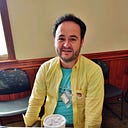Member-only story
Everybody needs an attaboy sometimes: Keeping up with James Drury

If natural causes had not felled James Drury on April 6, 2020, just 12 days shy of his 86th birthday, it seems certain that he would have continued extolling the virtues of The Virginian, COVID-19 be damned. Drury, who made hearts flutter with his ready-for-action rendering of television’s long-running Shiloh ranch foreman with no name, was a frequent guest at cowboy nostalgia festivals in his twilight years.
Typically antagonizing the white-hatted hero, Drury sat in on tons of episodic sagebrush sagas as far back as his fifth credited role in the inaugural 1955 season of Gunsmoke [i.e. “Reed Survives” plus three additional Dodge City stops]. Have Gun Will Travel, Cheyenne, Death Valley Days, The Rebel, The Rifleman, Rawhide, Wagon Train, Alias Smith and Jones, the cheesy Walker, Texas Ranger, and the tongue-in-cheek Adventures of Brisco County Jr. all benefitted from Drury’s ramrod presence. There was no question of his cowboy bona fides.
Drury’s movie arsenal, though not as prolific as his TV resume, was bolstered by his debut role as an uncredited hospital attendant in Glenn Ford’s Blackboard Jungle, one of Elvis Presley’s notorious rebel brothers in Love Me Tender, the cult sci-fi classic Forbidden Planet, and Disney’s tender Pollyanna with Hayley Mills. When his nine-year stint on The Virginian ignited the same year as his co-starring turn in Sam Peckinpah’s early masterpiece Ride the High Country in 1962, Drury was on his way to household name status.
Did the actor have a role model in mind for his most famous portrayal? “My maternal grandfather, John Crawford, was a quintessential Westerner,” admitted Drury in an exclusive May 2013 interview plugging his fifth and ultimately final appearance at the Midsouth Nostalgia Festival near Memphis. “He came West with a wagon train when he was 16 years old and settled in Oregon. He had been a cowboy, rancher, dirt farmer — all the things of the land that you can be. I split my childhood between New York City and working on my grandfather’s ranch. I was very proud to use some of his mannerisms and expressions in The Virginian. All actors do that — they visualize whatever character they think will fit the pistol and then they try to emulate it. That’s what I did, and it worked out pretty well.”
